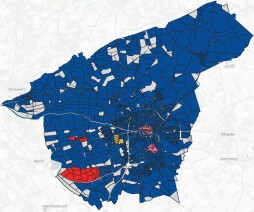
© Stadt Bocholt
Area classification of heat planning: red, yellow, pink = test areas for the construction and expansion of heating networks; blue = areas for decentralised heat supply to individual propertiesThe municipal heating plan has been adopted
Presentation of municipal heat planning for the city of Bocholt
Together with Bocholter Energie- und Wasserversorgung GmbH (BEW) and con|energy GmbH as experts, the city of Bocholt has drawn up the first municipal heating plan, which has now been unanimously approved by the city council.
The municipal heating plan is a master plan for the city of Bocholt. The heating plan is "technology-open" - this means that it neither prescribes nor prohibits specific heating technologies in certain areas. Rather, the heating plan provides a framework for orientation on how the transition to a climate-friendly heating supply in Bocholt could develop. It also shows which heating options are most likely to be chosen in the various neighbourhoods based on economic aspects.
Municipal heating planning does not include any binding expansion plans for heating and/or hydrogen networks, but aims to find out where potential heating networks could be economically expanded or built and where this is unlikely.
Heating networks in Bocholt
To date, there are two heating networks in Bocholt with a so-called pipe-bound heat supply: The heating network in the Feldmark West area has already been converted to a greenhouse gas-neutral supply by supplying heat from a biogas plant. If the heat demand of the areas supplied to date can be reduced through refurbishment, further expansion of this network is possible.
An alternative energy supply must be found for the small network at Europaplatz so that the heating network can then be extended to other areas of the city centre. Feasibility studies for the industrial park, Liedern and the Fildeken area are to determine the potential for the realisation of new heating networks.
It must now be examined in detail for all areas whether the expansion or new construction of heating networks is economically feasible for operators and users in Bocholt. Wherever this is not the case from the outset (see blue areas in the diagram), decentralised heating systems will be required, i.e. each property must be individually assessed to determine what type of heating can be used in the future.
Future heat supply
In the calculated scenarios, the heating planning sees electricity-based heating via heat pumps as the most economically likely heating option in most areas. A corresponding supply of electricity must therefore be guaranteed. In order to reduce the general heat demand, the need for increased refurbishment measures and further tests for potential heating networks is forecast.
A theoretical reutilisation of the gas networks with hydrogen and biomethane was also considered in the heat planning. At the present time, however, it is not possible to predict whether these gases will be available in sufficient quantities for everyone in the future and at what price they would then be traded.
In the next two to three years, Bocholter Stadtwerke will draw up a gas network and electricity network transformation plan. This is intended to show specifically whether and how the grids can be operated in a greenhouse gas-neutral manner in future. Among other things, it should ensure that an appropriate supply is guaranteed in areas where heating networks are unlikely and where decentralised heating systems would therefore have to be used.
Over the next few years, property owners will be able to obtain advice on the various options for new heating systems and refurbishment to reduce heating requirements. The city of Bocholt is planning corresponding subsidies for consultations by certified energy and efficiency consultants. The aim is to increase the refurbishment rate.
Basic information on heat planning can be found at www.bocholt.de/waermeplanung. Sascha Terörde from the City of Bocholt's Climate Protection Department will be happy to answer any questions about municipal heat planning on 02871 953-3002 or by email at waermeplanung(at)bocholt(dot)de.


